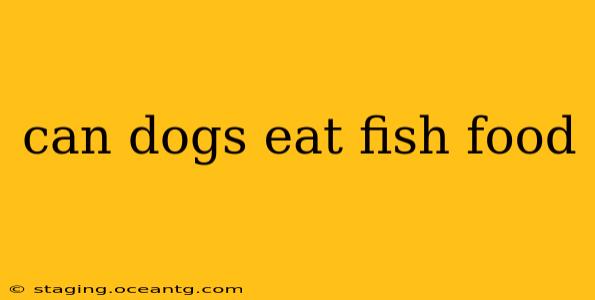Many pet owners wonder about the safety of sharing human or other pet foods with their canine companions. A common question revolves around fish food – can dogs eat it? The short answer is: generally no, dogs shouldn't eat fish food regularly. While a tiny nibble might not cause immediate harm, regular consumption can lead to several health problems. Let's delve deeper into why this is the case.
Why Shouldn't Dogs Eat Fish Food?
Fish food is formulated to meet the specific nutritional needs of fish, which are vastly different from those of dogs. These differences can lead to nutritional deficiencies or imbalances in dogs who consume it regularly.
-
Nutritional Imbalances: Dog food is carefully balanced to provide the right amount of protein, fats, carbohydrates, vitamins, and minerals. Fish food often lacks essential nutrients for dogs, such as taurine, which is crucial for heart health. Conversely, it might contain excessive levels of certain nutrients that can be harmful to dogs.
-
High Phosphorus Content: Many fish foods are high in phosphorus, which can be problematic for dogs with kidney issues. Excessive phosphorus can strain the kidneys and worsen existing conditions.
-
Artificial Colors and Preservatives: Some fish foods contain artificial colors, flavors, and preservatives that are not suitable for canine consumption. These additives can cause digestive upset or allergic reactions in sensitive dogs.
-
Digestive Problems: The ingredients and texture of fish food are often not easily digestible for dogs, potentially leading to vomiting, diarrhea, or other gastrointestinal issues.
What Happens if My Dog Eats Fish Food?
A small amount of fish food is unlikely to cause serious harm. However, monitor your dog for any signs of digestive upset, such as vomiting, diarrhea, or changes in appetite. If you notice any of these symptoms, contact your veterinarian immediately.
What are the Risks of Feeding My Dog Fish Food Regularly?
Regular consumption of fish food can lead to serious health consequences, including:
- Malnutrition: Lack of essential nutrients for canine health.
- Kidney Problems: High phosphorus levels can exacerbate kidney disease.
- Digestive Issues: Upset stomach, vomiting, and diarrhea.
- Allergic Reactions: Sensitivity to artificial ingredients.
- Pancreatitis: In rare cases, high fat content can contribute to pancreatitis.
What Should I Do if My Dog Eats Fish Food?
If your dog has ingested a small amount of fish food, observe them closely for any adverse reactions. If you notice any concerning symptoms, such as vomiting, diarrhea, lethargy, or loss of appetite, contact your veterinarian immediately. For large quantities ingested, immediate veterinary attention is recommended.
Can Dogs Eat Cooked Fish?
This is a different question altogether. Unlike fish food, cooked fish (plain, without seasonings or bones) can be a healthy occasional treat for dogs in moderation. Always ensure the fish is thoroughly cooked and boneless to avoid choking hazards and potential parasite infections.
What is the Best Food for My Dog?
Always consult your veterinarian for advice on the best diet for your dog, considering their age, breed, size, and health conditions. High-quality commercial dog food formulated to meet the AAFCO (Association of American Feed Control Officials) nutrient profiles is generally the best option for most dogs.
By understanding the differences between fish food and dog food, you can ensure your canine companion receives the proper nutrition they need for a healthy and happy life. Remember, always prioritize your dog's well-being and consult your veterinarian with any dietary concerns.
